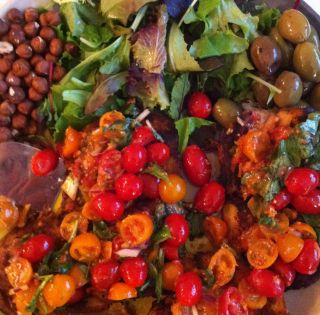Diet
New Dietary Rules: "Low Fat" Is Out, Olive Oil Is In
Extra-virgin olive oil is good for your heart.
Posted February 26, 2013

This week two studies were released reinforcing the importance of lifestyle choices and diet on reducing the risk of cardiovascular disease. Heart disease is the number one killer in America. Contrary to popular belief, a ‘low-fat’ diet is not necessarily the key to heart health.
The New England Journal of Medicine has just published a study showing that the Mediterranean diet supplemented with extra-virgin olive oil or tree nuts reduces the risk of suffering a cardiovascular death, a myocardial infarction or a stroke by 30 percent. Another study, published February 25 in the journal JAMA Pediatrics shows that giving back through volunteer work is good for your heart, even at a young age. Put these two together with some regular physical activity and you have a winning formula for well-being!
Olive Oil is Good for Your Heart
People have been talking about the benefits of the Mediterranean diet for a long time. The PREDIMED study published this week is monumental because of the scope, thoroughness, and dramatic findings of the research.
PREDIMED is the acronym for a study that began in 2003 designed to assess the Mediterranean diet as a primary prevention for cardiovascular diseases. The complete title of the study is “Effects of the Mediterranean diet on the primary prevention of cardiovascular diseases.”
The main objective of the study was to evaluate whether the Mediterranean diet supplemented with extra-virgin olive oil or tree nuts prevents cardiovascular diseases (cardiovascular death, myocardial infarction and/or stroke), by comparison with a low-fat diet. The findings released this week confirm that the Mediterranean diet reduced the risk of death from heart disease or stroke by 30 percent. This is huge!
A total of 7,447 people following major cardiovascular risk factors participated in the study. They were divided into three dietary intervention groups: a Mediterranean diet supplemented with extra-virgin olive oil, a Mediterranean diet supplemented with nuts (walnuts, almonds, hazelnuts), and a low-fat diet (animal and vegetable).
During the study, those participants who followed any of the two types of Mediterranean diet received freely extra-virgin olive oil (one liter per week), and nuts (30 grams per day; 15 grams of walnuts, 7.5 grams of almonds, and 7.5 grams of hazelnuts). After five years, it has been proved that participants who followed any of the two types of Mediterranean diet showed a substantial reduction in the risk of suffering a cardiovascular death, a myocardial infarction or a stroke.
According to the researchers, the results of PREDIMED study are relevant as they prove that a high-vegetable fat diet is healthier at a cardiovascular level than a low-fat diet. The authors state that the study has been controversial because it rejects the notion that it is necessary to reduce all fats in order to improve cardiovascular health.
Giving Back Promotes Heart Health
Many studies have shown that psychosocial factors, such as stress, depression, and isolation play a role in heart disease. Researchers from University of British Columbia's Faculty of Education and Department of Psychology wanted to find out how volunteering might impact physical health, particularly among adolescents.The first signs of cardiovascular disease can begin to appear during adolescence.
The volunteer group of students spent one hour per week working with elementary school children in after-school programs in their neighborhood. After 10 weeks these students had lower levels of inflammation, cholesterol, and lower BMIs (Body Mass Index) than the students who were wait-listed to participate.
The researchers measured the students' body mass index (BMI), inflammation and cholesterol levels before and after the study. They also assessed the students' self-esteem, mental health, mood, and empathy. "It was encouraging to see how a social intervention to support members of the community also improved the health of adolescents," says Hannah Schreier, who conducted this research during her doctoral studies at UBC.
"The volunteers who reported the greatest increases in empathy, altruistic behavior and mental health were the ones who also saw the greatest improvements in their cardiovascular health," says Schreier, now a postdoctoral fellow at the Icahn School of Medicine at Mount Sinai in New York.
Conclusion
The New York Times magazine had a cover story this week titled “The Extraordinary Science of Addictive Junk Food.” The article, by Michael Moss, illustrates how food companies fine tune the combination of fat, salt, and sugar in junk foods to attain the perfect “Bliss Point” that gets consumers hooked.
I wish that Moss' article had talked more about the psychology behind changing habits and overcoming the powerful lure of eating junk food. We all know what healthy foods are. The problem with depriving or forbidding foods is that it often sets up a vicious cycle of feeling deprived, cravings, binging... The exciting thing about the PREDIMED study is that it offers a way to satisfy our innate craving for fat with a healthy substitute.
One problem with the Mediterranean diet is that it’s expensive. The subjects in the study were given a free liter of extra-virgin olive oil (per week) which costs much more than most other oils. A bag of walnuts, almonds, or hazelnuts costs a lot more than a bag of Cheetohs. The same is true for any type of berry. Have you bought a container of blueberries or raspberries lately? Ouch! They are so expensive.
How are we going to ensure that people—especially children—from all socio-economic groups have access to a Mediterranean diet? Access to healthy and nutritious food is another huge class divider between the haves and have-nots. Corporations and policy makers have an obligation to create as even a playing field as possible when it comes to making healthy food affordable.




